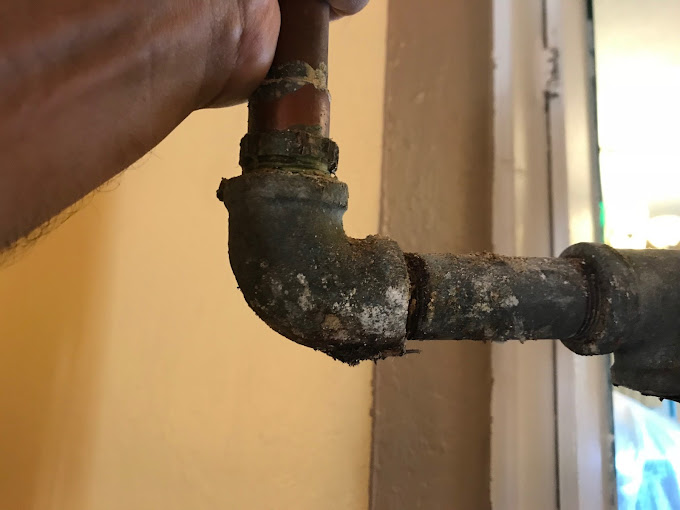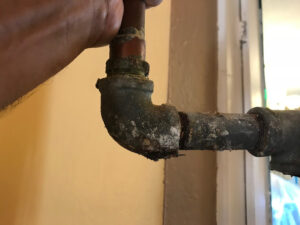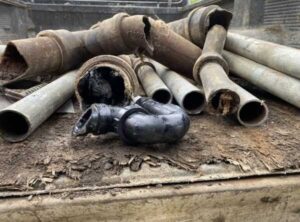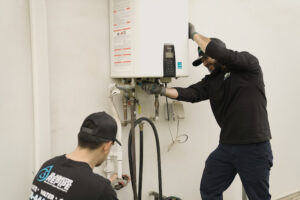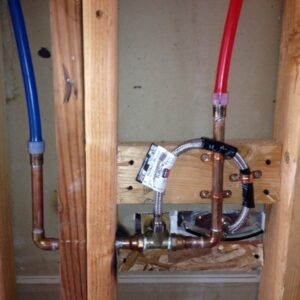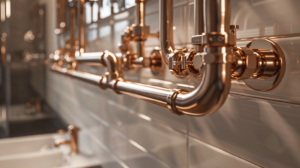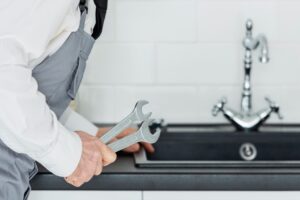When you’re considering a water heater replacement, there are key factors to keep in mind to ensure the process goes smoothly. You will want to assess your current unit’s performance and age while also determining the hot water needs of your household. It’s also essential to research different models and consider energy efficiency options. However, the most crucial decision often lies in whether to hire a qualified professional or tackle the installation yourself. Understanding the pros and cons of each choice can significantly impact your experience, so let’s explore what you need to know before making that commitment.
Assess Your Current Water Heater
How well is your current water heater performing? If you’re noticing inconsistent water temperatures, strange noises, or leaks, it might be time to assess its condition.
Start by checking the age of your water heater; most units last about 10-15 years. If it’s nearing the end of its lifespan, consider scheduling a consultation with a plumber to evaluate your options for water heater replacement.
Next, examine the water quality. If you’re experiencing discoloration or unpleasant odors, it could indicate sediment buildup or corrosion. These issues not only affect performance but can lead to severe damage over time.
Don’t forget to check for leaks around the base or connections. A small leak can quickly escalate if left unaddressed.
Being proactive is vital. If you identify any problems, a plumber San Jose can provide valuable insights into whether a repair suffices or if a water heater replacement is necessary.
By assessing your current water heater’s performance, you will save yourself potential headaches and ensure you’re prepared for the next steps in securing a reliable hot water supply.
Don’t wait until a minor issue turns into a major inconvenience!
Determine Your Hot Water Needs
Before you choose a new water heater, it’s crucial to determine your hot water needs.
Start by evaluating how much hot water you use daily. Consider the number of people in your household and their typical usage patterns—like showers, laundry, and dishwashing.
Next, think about peak usage times. Do you have multiple family members showering in the morning? Are you running the dishwasher while someone else is doing laundry? These factors can help you gauge the required capacity of your new water heater.
You should also consider the type of appliances you own. For instance, if you have a large soaking tub, it will need more hot water than a standard shower.
Another key aspect is your lifestyle. If you frequently host guests or have a large family, you will want a unit that can keep up with increased demand.
Conversely, if it’s just you or a couple, a smaller model might suffice.
Research Different Models
After assessing your hot water needs, it’s time to explore the various water heater models available. You will find a range of options, including tankless, storage tank, and heat pump water heaters. Each model has its pros and cons, so understanding these differences is crucial.
Tankless water heaters heat water on demand, which means you won’t run out of hot water. They’re compact and energy-efficient, but installation costs can be higher.
Storage tank models are the most common and store a set amount of hot water, but they can take up more space and may run out of hot water during peak usage.
Heat pump water heaters are energy-efficient and can save you money in the long run, but they require specific installation conditions.
As you research, consider factors like size, fuel type, and your budget. Read customer reviews and expert ratings to gauge reliability and performance.
Don’t forget to check warranties! Understanding the various models will help you make an informed choice that suits your household’s needs, ensuring you get the best performance and value for your investment.
Consider Energy Efficiency Options
Energy efficiency can significantly impact your water heating costs and environmental footprint. When you’re selecting a new water heater, consider models that boast high energy efficiency ratings. Look for the Energy Factor (EF) rating; the higher the number, the more efficient the unit.
You might also want to explore tankless water heaters, which heat water on demand instead of storing it. This can save you money over time since they eliminate standby energy losses associated with traditional tank models.
Additionally, consider solar water heaters, which harness the sun’s energy and can drastically reduce your utility bills.
Another option is to check for units that are ENERGY STAR certified. These models meet strict efficiency guidelines set by the Environmental Protection Agency, ensuring you’re choosing a product that limits energy consumption while still providing reliable hot water.
Lastly, don’t forget about insulation. Insulating your pipes and the water heater can prevent heat loss, enhancing overall efficiency.
Choose Between Electric and Gas
When it comes to selecting a water heater, one of the key decisions you will face is whether to go with an electric or gas model. Each option has its advantages, so it’s essential to weigh your needs and circumstances before making a choice.
Electric water heaters are generally easier to install and require less maintenance. They can be a great choice if you don’t have existing gas lines or if you’re looking for a straightforward installation.
Plus, they often have lower upfront costs compared to gas models. However, keep in mind that electricity can be more expensive in some areas, which might affect your long-term utility bills.
On the other hand, gas water heaters typically heat water faster and may have lower operating costs, especially if natural gas rates are lower than electricity in your region.
They can provide more hot water during peak usage times, making them ideal for larger families.
Consider your home’s existing infrastructure, energy costs, and your hot water needs. By carefully evaluating these factors, you will be better equipped to choose the right water heater for your situation.
Understand Installation Requirements
Choosing the right type of water heater is just the beginning; understanding the installation requirements is equally important. Before diving into your replacement project, you need to familiarize yourself with local building codes and regulations. These guidelines can vary significantly depending on where you live, so don’t overlook them.
Next, consider the space where your water heater will go. Measure the area to ensure your new unit fits comfortably, allowing for proper ventilation and accessibility for maintenance.
Also, check the connections for gas, plumbing, and electrical systems, as these must be compatible with your new heater.
Think about the energy source, too. If you’re switching from electric to gas or vice versa, you may need additional work done on your home’s infrastructure.
Hire a Qualified Professional
Hiring a qualified professional is crucial for a smooth water heater replacement. You might think about handling the installation yourself to save a few bucks, but that can lead to costly mistakes.
Professionals have the right training and experience to ensure everything is done safely and efficiently. They will know the local codes and regulations, which can save you from potential fines or complications down the line.
When you hire a licensed plumber or technician, you’re also getting a warranty on their work. This gives you peace of mind, knowing that if anything goes wrong, you won’t be left to figure it out alone.
Plus, they will have the proper tools and equipment to handle the job, making the installation faster and more reliable.
Before hiring, check their credentials and reviews. Ask for references and don’t hesitate to reach out to past clients. A good professional will be transparent about their process and pricing, helping you avoid any surprises.
In the end, investing in a qualified expert won’t only save you time and stress but also ensure your new water heater operates efficiently for years to come.
Prepare for Installation Day
Preparation is key for a smooth installation day. Start by clearing the area around your existing water heater. Remove any obstacles, such as boxes or furniture, that might hinder the technician’s access. This will help them work efficiently and safely.
Also, ensure there’s a power source and water supply available for the new unit.
Check the installation schedule and confirm the arrival time with your technician. If they need to access your home, make sure you’re available, or arrange for someone else to be there. It’s also wise to ask about any specific requirements or tools they might need, so you can have everything ready.
Consider turning off the power and water supply to your existing water heater the day before installation. This will prevent any surprises on the day itself.
If you have pets, it’s a good idea to keep them in a separate room to avoid distractions during the installation process.
Lastly, prepare to ask any lingering questions you might have. Being proactive about your concerns can lead to a better understanding of your new system and its maintenance.
With these steps, you will be set for a successful installation day.
Dispose of the Old Unit
Proper disposal of your old water heater is crucial for both safety and environmental reasons. You can’t just toss it in the trash, as there are specific regulations and guidelines you need to follow.
First, check with your local waste management authority to see if they offer a pick-up service for large appliances. Many municipalities have designated days for bulk item collection, which is a safe way to dispose of your old unit.
If you’re planning to do it yourself, you will need to ensure it’s completely drained and disconnected from any water and gas lines. Wear protective gear, including gloves and goggles, to avoid any injuries during the process.
Another option is to recycle the unit. Contact local scrap yards or recycling centers to see if they accept water heaters. Many of these facilities will even pick up the unit from your home, making the process easier for you.
Lastly, consider donating if your old heater is in good working condition. Some organizations might take it off your hands, helping someone in need while ensuring it doesn’t sit in a landfill.
Always prioritize safety and proper disposal methods.
Perform Regular Maintenance
Regular maintenance is key to extending the life of your new water heater and ensuring it operates efficiently.
Start by checking the temperature setting; it should be around 120°F for optimal performance. This not only saves energy but also prevents scalding.
Next, inspect the pressure relief valve regularly. Lift the lever to ensure it’s functioning properly and releasing excess pressure. If you notice any leaks or rust, it’s time to call a professional.
Flushing the tank at least once a year is another crucial step. Sediment buildup can reduce efficiency and lead to costly repairs. To do this, turn off the heater, connect a hose to the drain valve, and let the water run until it’s clear.
Don’t forget to check the anode rod every few years. This rod helps prevent corrosion inside the tank, and replacing it can significantly extend its lifespan.
By following these essential tips, you can ensure a smooth water heater replacement. Assess your current unit, determine your hot water needs, and research models that fit your budget and efficiency preferences. Whether you choose electric or gas, hiring a qualified professional will keep everything safe and up to code. Don’t forget to prepare for installation day and plan for disposing of the old unit. With regular maintenance, your new water heater will serve you well for years to come.
Why Choose Us?
At Gladiator Plumbing & Repipe, customer satisfaction is our top priority. Our team provides transparent pricing, clear communication, and fast, reliable installation, ensuring minimal disruption to your daily routine. With years of experience serving San Jose homeowners, we understand the unique plumbing needs of the area and are committed to providing efficient, durable, and long-lasting water heater solutions tailored to your specific requirements. Trust us to deliver the best water heater replacement service and keep your home’s water supply running smoothly.
Gladiator Plumbing & Repipe San Jose
541 W Capitol Expy Ste 10, San Jose, CA 95136
(408) 444 2696

